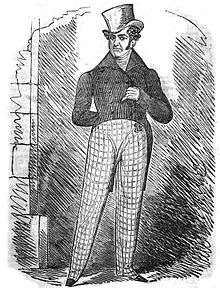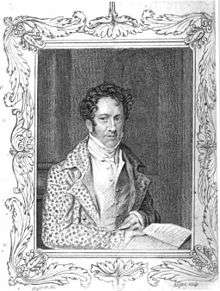Benjamin Wrench
Benjamin Wrench (1778–1843), was an actor, born in 1778 in London, where his father occupied ‘a lucrative appointment in the Exchequer.’ He seems to have been grandson of Sir Benjamin Wrench, M.D., of Norwich (d. 1747, aged 82) (see Notes and Queries, 5th ser. v. 48). His father died before he reached his seventh year, and having declined a proffered living and a commission in the army offered by General Tryon, a relative, Wrench adopted the stage as a profession, making his first appearance at Stamford.

Acting career
Whatever ability he had was slow in ripening, and he had to rehearse for fourteen days the part of Francis in The Stranger before he could be allowed to essay it. Mrs. Hannah Henrietta Robinson Taylor (c1757-1837) 21 years his senior, was the co-manager of the Stamford & Nottingham circuit, whom he married (as her third husband) on 9 August 1802 at All Saints church, Stamford, she coached him carefully and brought out such ability as he possessed. His eldest step-daughter Elizabeth Robinson had married another company actor and co-manager James Robertson on 6 October 1791 and another step-daughter, Mary Henrietta Robinson had married Thomas Manly (Wilson) on 8 August 1801. [2] The theatrical partnership lasted just two and a half years, in March 1805 James Robertson announced that Mr Alcock had purchased Mrs Wrench's 'theatrical property'. Wrench and Hannah then joined in York the company of Tate Wilkinson, whose praise he obtained, and proceeded to Edinburgh, where with complete success he played Othello, Gossamer, Job Thornberry, and Jeremy Diddler. The marriage was a disaster and they later pursued separate careers. He had a drink problem and later left his wife in financial difficulties. She died in Melton Mowbray in 1837 aged 80. [3]
When Robert William Elliston in 1804 quit Bath, he was replaced by Wrench, who made his appearance on 5 January 1805 as Gossamer in Laugh when you can, and Walter in Children in the Wood. [4] In the new Bath house Wrench opened on 26 October 1805 as Percy in the Castle Spectre. He played during the season Archer in Beaux Stratagem, Orlando, Belcour in The West Indian, and Pedro in The Pilgrim. He then returned to York, and while there received an offer from Drury Lane, where he appeared, with the company then temporarily occupying the Lyceum, as ‘Wrench from Bath and York,’ playing on 7 October 1809 Belcour in The West Indianand Tristram Fickle in The Weathercock. [5]
At Drury Lane Wrench remained until 1815. [6] He left Drury Lane that year, and divided his time between the Lyceum and the country — Birmingham, Bristol, Dublin, and other large towns. At the Lyceum he was on 29 Aug. 1818 the first Wing in Peake's Amateurs and Actors, the first Jenkins in Gretna Green, and the first Sir John Freeman in Free and Easy. In 1820, as Captain Somerville in Capers at Canterbury, he made his first appearance at the Adelphi, where he made perhaps his greatest success on 26 November 1821 as Corinthian Tom in Moncrieff's Tom and Jerry, or Life in London.
On 4 October 1826 Wrench appeared for the first time at Covent Garden, enacting Rover in Wild Oats.[7] He had made a great success at the Lyceum in He lies like Truth, and was at that house when (16 Feb. 1830) it was burnt to the ground. In 1834, in the rebuilt house, Wrench and Keeley made a great hit in Oxenford's I and my Double. On 30 Oct. at the Haymarket he was the first Caleb Chizzler in But however by Henry Mayhew and Henry Baylis. In 1840 Wrench was at the Olympic. His last engagement was at the Haymarket.
In the country Wrench played a large round of comic characters, including Charles Surface, Dr. Pangloss, Captain Absolute, and many others. Wrench was a good comedian, but never reached the first rank. Oxberry, who often played with him, speaks of him as knock-kneed, and says that, adopting Robert William Elliston as model, he copied his nasal twang and drawling doubtful delivery, mistook abruptness for humour, and was less a gentleman on the stage than a "blood" (rake).
Personal life

On 24 Oct. 1843 he died at his lodgings in Pickett Place, London, in his sixty-sixth year. Wrench and Manly, an actor, were engaged respectively to Miss Robinson and Mrs. Taylor of Nottingham, but ultimately changed partners, Wrench marrying Mrs. Taylor and Manly her daughter. Wrench's marriage was not happy. He was charged with leaving his wife necessitous while he indulged in tavern dissipations. His wife had formerly, as Mrs. Taylor, been an actress of some ability (see Thespian Dictionary, under Taylor [Mrs. Robinson]).
Wrench was medium height, light complexioned, with high shoulders and flat features. A portrait of him, by Sharpe, as Wing in ‘Amateurs and Actors,’ and one by De Wilde as Sir Freeman in ‘Free and Easy,’ are in the Mathews collection in the Garrick. His portrait as Belmour is in Oxberry's ‘Dramatic Biography,’ and as Benedick in the ‘Theatrical Inquisitor’ for January 1814. An image from 'Fashion in Success' is also in the book on the Lincolnshire Circuit by Neil R Wright.[9]
References
- "Mr Benjamin Wrench", Actors by Daylight, Volume 1, Publisher J. Pattie, 1838, page 177
- Neir R Wright (2016). Treading the Boards. SLHA. p. 131.
- Neil R Wright (2016). Treading the Boards. SLHA. p. 132.
- Cheveril in Thomas Holcroft's Deserted Daughter, Aircourt in O'Keeffe's Lie of the Day, Young Rapid in Cure for the Heartache, Doricourt in the Belle's Stratagem, Rolando in The Honey moon, Sir Robert Ramble in Every one has his Fault, Beauchamp in Which is the Man? Job Thornberry in John Bull, Jeremy Diddler in Raising the Wind, Sir Charles Racket in Three Weeks after Marriage, and Jaffier in Venice Preserved, followed during the season, which was the last in the old Bath theatre.
- Frank Heartall in The Soldier's Daughter, Lenitive in The Prize, Howard in Reynolds's Will, Marplot, Frederick in The Poor Gentleman, Captain Absolute, Benedict, Charles Austencourt in Man and Wife, Delaval in Matrimony, Colonel Lambert in Hypocrite, Storm in Ella Rosenberg, Loveless in Trip to Scarborough, Millamour in Know your own Mind, with some other parts in which he had been seen in Bath, were given in his first season; he was also seen as the first Henry Torringham in Cobb's Sudden Arrivals (19 Dec. 1809), and Edward Lacey in Riches, adapted by Sir James Bland Burges from Massinger's City Madam. Genest says he showed himself a good actor, but was no adequate substitute for Elliston.
- He added to his repertory Sir Harry Beagle in the Jealous Wife, Marquis in Midnight Hour, Duke in The Honey Moon, Beverley in All in the Wrong, Floriville in Dramatist, Duke's Servant in High Life below Stairs, the Copper Captain, Dick in Heir-at-Law, Gratiano, Frank in School for Authors, Major Belford in Deuce is in him, Bob Handy in Speed the Plough, and Count Basset in The Provoked Husband. He played a few original characters in obscure plays of Masters, Millingen, Leigh, and other forgotten dramatists, among which may be named Gaspar in the Kiss, taken by Clarke from the Spanish Curate of Fletcher, 31 Oct. 1811; Sir Frederick Fillamour in Mrs. Le Fanu's Prejudice, 11 April 1812; Captain Blumenfield in How to die for Love, taken from Kotzebue, 21 May; Professor Trifleton in Horace Smith's First Impressions, 30 Oct. 1813; Captain Enrico in T. Dibdin's Who's to have her? 22 Nov.; and Volage in Henry Siddons's Policy, 14 Oct. 1814.
- He played Volatile in Wife's Stratagem, Antipholus of Syracuse, Lord Trinket in Jealous Wife, Sponge in A Race for a Dinner, Duretête in The Inconstant, Tom Shuffleton in John Bull, Almaviva in Marriage of Figaro, and was the first Pedrillo in Dimond's Seraglio, 24 Nov.; Rosambert in Moncrieff's Somnambulist, 10 Feb. 1828; and Aufait in Little Offerings, 26 April. During the following season he was Rochester in Charles the Second, Mercutio, Kite in The Recruiting Officer, Valcour, an original part, in Pocock's Home, Sweet Home, 19 March 1829; Peter Shock in Master's Rival, and Frankly in Suspicious Husband. In 1829–1830, where the records of Genest end, he was the first Tarleton in Somerset's Shakespeare's Early Days, 29 Oct. 1829; Quickset in The Phrenologists, 12 Jan. 1830; Richard Jones in the Wigwam, founded on Cooper's Pioneers, 12 April; Captain Fervid in The Colonel, 4 May. He was also seen as Captain Tickall in Husbands and Wives, Baron Wolfenstein in the Poacher, and Flutter in Belle's Stratagem.
- C.E. Oxberry (editor), "Memoir of Benjamin Wrench" Oxberry's dramatic biography and histrionic anecdotes", Published 1826, page 144
- Neil R Wright (2016). Treading The Boards. SLHA. p. 131.

- Oxberry's Dramatic Biography, vol. iv.
- Genest's Account of the English Stage
- Dramatic and Musical Review, November 1843
- "Memoir of Mr Wrench", Theatrical Inquisitor, vol. iv. publ. Chapple, 1814, page 3
- Memoirs of Munden; Donaldson's Recollections of an Actor
- Authentic Memoirs of the Green Room, n.d. (1814)
- Theatrical Looker on, Birmingham, 1823
- "Mr Wrench", Biography of the British Stage, 1824, page 275
- "Mr Wrench (Obituary)", Gentleman's magazine, 1844, i. page 438.
External links
- Benjamin Wrench as Fashion in "Success", Etching by Adcock, G., Publisher I. Gifford & Co. in "Portraits of Actors, 1720-1920", University of Illinois Library
- Attribution
![]()